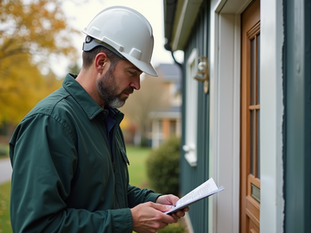
The Benefits of Comprehensive Home Inspections
Sep 18
3 min read
0
2
0
When buying or selling a home, understanding the property's condition is crucial. A detailed home inspection provides valuable insights that can save money, prevent future problems, and offer peace of mind. This article explores the many benefits of detailed home inspections and why they are an essential step in any real estate transaction.
Why Detailed Home Inspections Matter
A detailed home inspection is a thorough examination of a property's structure, systems, and components. It goes beyond a simple walkthrough and looks for hidden issues that could affect the home's safety, value, and livability.
Key reasons to invest in detailed home inspections include:
Identifying safety hazards: Inspectors check for electrical problems, gas leaks, mold, and other dangers.
Uncovering costly repairs: Early detection of issues like roof damage or plumbing leaks can save thousands.
Negotiation leverage: Buyers can request repairs or price reductions based on inspection findings.
Peace of mind: Knowing the home's condition helps buyers feel confident in their purchase.
For example, a detailed inspection might reveal a faulty foundation or outdated wiring that could pose risks or require expensive fixes. Without this knowledge, buyers might face unexpected costs after moving in.

What Detailed Home Inspections Cover
A comprehensive inspection covers many aspects of a home, including:
Structural components: Foundation, walls, ceilings, floors, and roof.
Exterior elements: Siding, windows, doors, gutters, and drainage.
Roofing system: Shingles, flashing, chimneys, and ventilation.
Plumbing: Pipes, fixtures, water heaters, and drainage.
Electrical system: Wiring, outlets, panels, and grounding.
Heating and cooling: HVAC units, ductwork, and thermostats.
Interior features: Walls, ceilings, floors, stairs, and fireplaces.
Insulation and ventilation: Attic and crawl space conditions.
Each area is carefully inspected to identify defects, wear, or code violations. Inspectors use specialized tools like moisture meters and infrared cameras to detect hidden problems.
For instance, a detailed home inspection might find that the HVAC system is nearing the end of its lifespan, allowing buyers to plan for replacement costs.

How to Choose a Qualified Inspector
Selecting the right professional for detailed home inspections is vital. Here are some tips to ensure you hire a qualified inspector:
Check credentials: Look for certifications from reputable organizations such as ASHI or InterNACHI.
Quality matters: Choose inspectors with positive reviews.
Ask about the process: A good inspector will explain what they check and provide a detailed report.
Attend the inspection: Being present allows you to ask questions and see issues firsthand.
Compare prices: While cost is important, don’t sacrifice quality for a lower fee.
A qualified inspector will provide a clear, unbiased assessment that helps you make informed decisions.

The Financial Advantages of Detailed Home Inspections
Investing in detailed home inspections can lead to significant financial benefits:
Avoid unexpected repairs: Knowing about problems eupfront helps buyers avoid costly surprises.
Negotiate better deals: Inspection reports can be used to request repairs or price reductions.
Plan maintenance: Identifying issues early allows homeowners to budget for future repairs.
Increase resale value: Sellers who fix problems before listing can attract more buyers and higher offers.
For example, a buyer who discovers a leaking roof during inspection can negotiate with the seller to repair it before closing or reduce the price accordingly. This proactive approach protects the buyer’s investment.
Enhancing Home Safety and Comfort
Beyond finances, detailed home inspections improve safety and comfort. Inspectors identify hazards such as:
Faulty wiring that could cause fires
Mold growth affecting air quality
Structural weaknesses risking collapse
Poor ventilation leading to moisture problems
Addressing these issues ensures the home is safe for occupants and reduces health risks. Additionally, inspections can highlight energy efficiency improvements, such as better insulation or upgraded windows, which enhance comfort and lower utility bills.
Taking the Next Step with Comprehensive Home Inspections
Whether you are buying or selling, detailed home inspections are a smart investment. They provide a clear picture of the property’s condition and help avoid costly mistakes. For those seeking reliable and thorough inspections, comprehensive home inspections offer expert services tailored to your needs.
By prioritizing a detailed inspection, you protect your financial interests, ensure safety, and gain confidence in your real estate decisions.
Investing in a detailed home inspection is a proactive step that benefits everyone involved in a property transaction. It uncovers hidden problems, supports fair negotiations, and promotes a safer, more comfortable living environment. Make sure to schedule your inspection with a trusted professional to enjoy these advantages fully.






